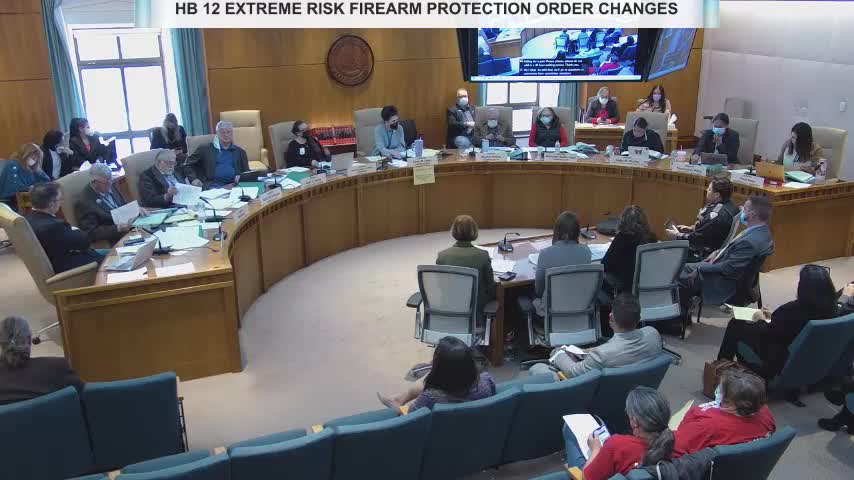New Mexico Committee Discusses Firearm Possession Laws for Threatened Individuals
March 09, 2025 | Health and Public Affairs, Senate, Committees, Legislative, New Mexico
This article was created by AI summarizing key points discussed. AI makes mistakes, so for full details and context, please refer to the video of the full meeting. Please report any errors so we can fix them. Report an error »

In a pivotal meeting held on March 9, 2025, the New Mexico Senate's Health and Public Affairs Committee delved into critical discussions surrounding proposed legislation aimed at firearm safety and mental health interventions. The atmosphere was charged with concern as committee members scrutinized the implications of a bill designed to manage firearm possession for individuals deemed a threat to themselves or others.
At the heart of the debate was the provision that individuals under a protection order would be prohibited from purchasing or possessing firearms for a year. Questions arose regarding the effectiveness of this measure and the potential for repeat offenders to exploit the system. One senator expressed apprehension about the lack of ongoing intervention after the year-long prohibition, highlighting the risk that individuals could return to dangerous behaviors without any mandated behavioral health assessments or training.
The committee members sought clarity on how the proposed legislation would be enforced and monitored. It was noted that once a protection order is granted, the individual’s information would be entered into a federal database, effectively barring them from firearm purchases during the order's duration. However, concerns lingered about the automatic removal of their status from the database after one year, raising fears that individuals could cycle back into possession of firearms without adequate oversight.
Supporters of the bill argued that it provides a necessary mechanism for law enforcement to manage firearms in high-risk situations. They emphasized that the law does not prevent law enforcement from pursuing additional charges if individuals violate other laws. However, the lack of statistical measures to evaluate the bill's effectiveness in preventing future incidents was a point of contention. One senator questioned whether the legislation truly addresses the underlying behavioral health issues that often accompany firearm-related crises.
The discussion also touched on the broader implications of firearm safety in both urban and rural settings across New Mexico. While the bill has been implemented in various counties, including rural areas, the committee acknowledged the need for more comprehensive data to understand its impact on different communities.
As the meeting concluded, the committee was left grappling with the balance between protecting public safety and ensuring that individuals receive the necessary support to address their mental health challenges. The outcome of this legislation could have lasting effects on how New Mexico navigates the complex intersection of gun rights and mental health, leaving many to wonder what steps will be taken next to ensure both safety and accountability.
At the heart of the debate was the provision that individuals under a protection order would be prohibited from purchasing or possessing firearms for a year. Questions arose regarding the effectiveness of this measure and the potential for repeat offenders to exploit the system. One senator expressed apprehension about the lack of ongoing intervention after the year-long prohibition, highlighting the risk that individuals could return to dangerous behaviors without any mandated behavioral health assessments or training.
The committee members sought clarity on how the proposed legislation would be enforced and monitored. It was noted that once a protection order is granted, the individual’s information would be entered into a federal database, effectively barring them from firearm purchases during the order's duration. However, concerns lingered about the automatic removal of their status from the database after one year, raising fears that individuals could cycle back into possession of firearms without adequate oversight.
Supporters of the bill argued that it provides a necessary mechanism for law enforcement to manage firearms in high-risk situations. They emphasized that the law does not prevent law enforcement from pursuing additional charges if individuals violate other laws. However, the lack of statistical measures to evaluate the bill's effectiveness in preventing future incidents was a point of contention. One senator questioned whether the legislation truly addresses the underlying behavioral health issues that often accompany firearm-related crises.
The discussion also touched on the broader implications of firearm safety in both urban and rural settings across New Mexico. While the bill has been implemented in various counties, including rural areas, the committee acknowledged the need for more comprehensive data to understand its impact on different communities.
As the meeting concluded, the committee was left grappling with the balance between protecting public safety and ensuring that individuals receive the necessary support to address their mental health challenges. The outcome of this legislation could have lasting effects on how New Mexico navigates the complex intersection of gun rights and mental health, leaving many to wonder what steps will be taken next to ensure both safety and accountability.
View full meeting
This article is based on a recent meeting—watch the full video and explore the complete transcript for deeper insights into the discussion.
View full meeting
